


Atrial fibrillation with rapid ventricular response (AFib with RVR) poses significant risks that we must address with care. If left untreated, this condition can lead to serious complications, such as stroke and heart failure, which can be life-threatening. It’s understandable to feel anxious about these risks, but recognizing them is the first step toward taking control of your health.
Proactive management and early detection are crucial in mitigating these dangers. When AFib is untreated, the chances of experiencing a stroke increase, and life expectancy can be significantly reduced. This is why it’s so important to seek timely medical intervention and consider lifestyle modifications. Remember, you’re not alone in this journey; there are supportive resources available to help you.
Have you thought about how making small changes in your daily routine could positively impact your health? Simple adjustments can lead to significant improvements. By reaching out for help and discussing your concerns with a healthcare professional, you can take proactive steps toward a healthier future.
In addition to this, embracing a supportive community can make a world of difference. You deserve to feel empowered and informed about your health. Together, we can navigate these challenges and work towards a brighter, healthier tomorrow. Your well-being is our priority, and we’re here to support you every step of the way.
Atrial fibrillation with rapid ventricular response (AFib RVR) can be concerning, especially when it raises fears about health and mortality. As this condition becomes more common, particularly among older adults, it’s essential to understand its implications and risks. This article gently explores the complexities of AFib RVR, focusing on the critical factors that can help manage it effectively and the proactive steps that can significantly improve patient outcomes.
What can you do to reduce these risks? How can timely intervention change the course of this condition? These are important questions that deserve thoughtful consideration. By understanding AFib RVR and its management, individuals can take meaningful steps toward better health. Remember, you are not alone in this journey; support is available, and taking action can lead to positive changes.
At Amavita Heart and Vascular Health, we understand that a common concern is, can you die from afib with rvr while managing atrial fibrillation with rapid ventricular response. Founded in 2017 by Dr. Pedro Martinez-Clark, our practice is dedicated to providing compassionate care that truly reflects our belief in the Latin meaning of 'Amavita'—'love life.' We want to help you not just live longer, but live better.
Our commitment to innovative cardiovascular care means that each patient receives personalized attention tailored to their unique needs. We utilize advanced outpatient procedures, allowing you to return home the same day, and we employ cutting-edge diagnostic tools and treatment protocols to ensure the best outcomes. This is especially important for elderly individuals who may face additional challenges in managing AFib.
In addition to this, our independence allows us to prioritize your needs without compromise. The positive experiences shared by our patients speak volumes; many commend the professionalism and warmth of our dedicated team. We strive to create an environment where you feel valued and understood.
At Amavita, we believe that cardiovascular care should enhance your quality of life. Our goal is to empower you to live a healthier, more fulfilling life. If you have concerns about your heart health, we encourage you to reach out. Together, we can navigate your journey towards better heart health.
It is concerning to consider if can you die from afib with rvr, especially if atrial fibrillation with rapid ventricular response (AF) is not managed properly. One of the most significant risks is the increased chance of stroke, primarily due to blood clots forming in the heart. These clots can break loose and travel to the brain, leading to serious consequences. In fact, untreated atrial fibrillation raises the risk of stroke by five times, underscoring the importance of addressing this condition promptly.
In addition to this, atrial fibrillation with rapid ventricular response can contribute to heart failure. When the heart beats too quickly, it struggles to pump blood effectively, which can weaken the heart muscle over time. This progressive nature of atrial fibrillation means that individuals may experience worsening symptoms, such as shortness of breath and fatigue, as the condition advances.
Current research indicates that by 2030, over 12 million people in the United States will be affected by atrial fibrillation. This statistic highlights the need for early detection and intervention. Real-life stories reveal the serious consequences of untreated AFib RVR, raising the question, can you die from afib with rvr, as many individuals face debilitating strokes or heart failure due to delayed treatment.
Understanding these risks is vital for patients. Proactive management can lead to significantly better outcomes. Amavita's CardioElite™ program provides comprehensive arrhythmia management, combining advanced monitoring technology, AI, and 24/7 cardiology consultation to help restore the heart's natural rhythm. Making lifestyle changes, such as losing weight and staying active, can also help reduce some risk factors associated with atrial fibrillation. Furthermore, maintaining open communication with healthcare providers is crucial, as atrial fibrillation is a chronic condition that requires ongoing management strategies.
If you or a loved one are facing these challenges, remember that support is available. Don't hesitate to reach out for help; together, we can work towards a healthier future.
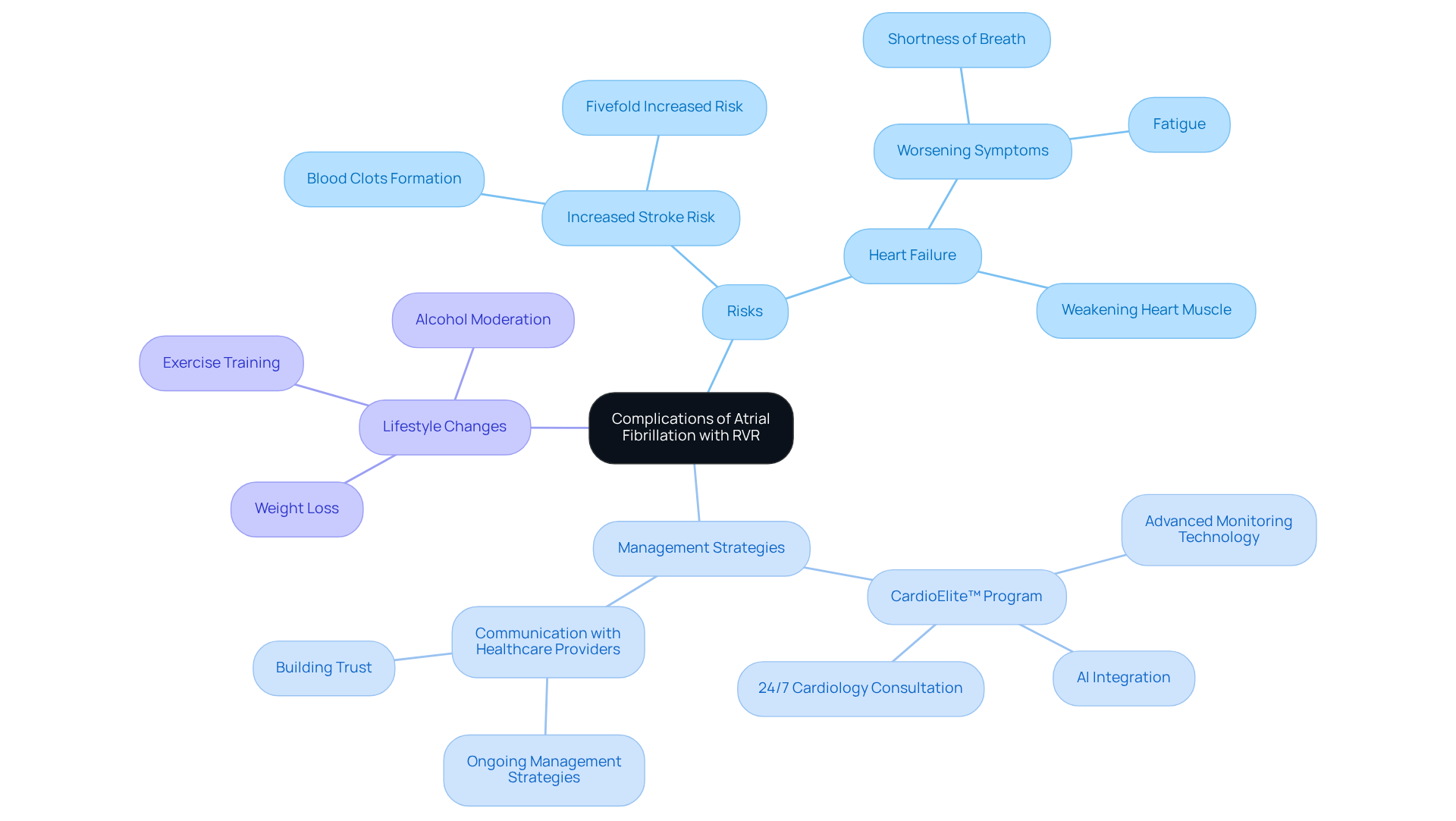
Atrial fibrillation with rapid ventricular response (RVR) can lead to several common symptoms that might concern you, such as palpitations, shortness of breath, dizziness, and fatigue, prompting the question: can you die from afib with rvr? If you’re older, you might also experience chest discomfort or feelings of anxiety. Recognizing these symptoms early is crucial, as they can indicate a worsening condition that leads to the concern, can you die from afib with rvr, requiring immediate medical attention.
It’s important to note that many older adults may not exhibit the typical signs of atrial fibrillation, which makes being alert to changes in your health even more vital. For example, studies show that nearly 57% of individuals report palpitations, while 64% experience dyspnea. This highlights the variability in how symptoms can present themselves among older adults.
Healthcare professionals stress the importance of awareness, especially to address concerns like can you die from afib with rvr, particularly since the risk of stroke associated with AF increases significantly with age—rising from 1.5% at ages 50-59 to 23.5% for those aged 80-89. Additionally, AF accounts for around 10%-20% of all strokes, leading to the question of can you die from afib with rvr, which underscores the importance of recognizing AFib symptoms in the context of stroke risk.
At Amavita Heart and Vascular Health, we’re here to provide specialized cardiovascular care for individuals at high risk. We utilize advanced imaging and thorough evaluations to ensure that your symptoms are properly assessed and managed. Our approach includes comprehensive arrhythmia management and addressing potential valve disease. We understand that many older individuals may show unusual symptoms or remain asymptomatic until a significant event occurs, such as a stroke.
That’s why proactive monitoring and education about these symptoms are crucial, especially regarding the question, can you die from afib with rvr, as they can lead to timely interventions and better outcomes for older individuals. We encourage caregivers and individuals to keep a symptom diary and pursue regular check-ups to track any changes in health status. This way, you can ensure thorough management of arrhythmia and heart valve disease, and feel supported every step of the way.
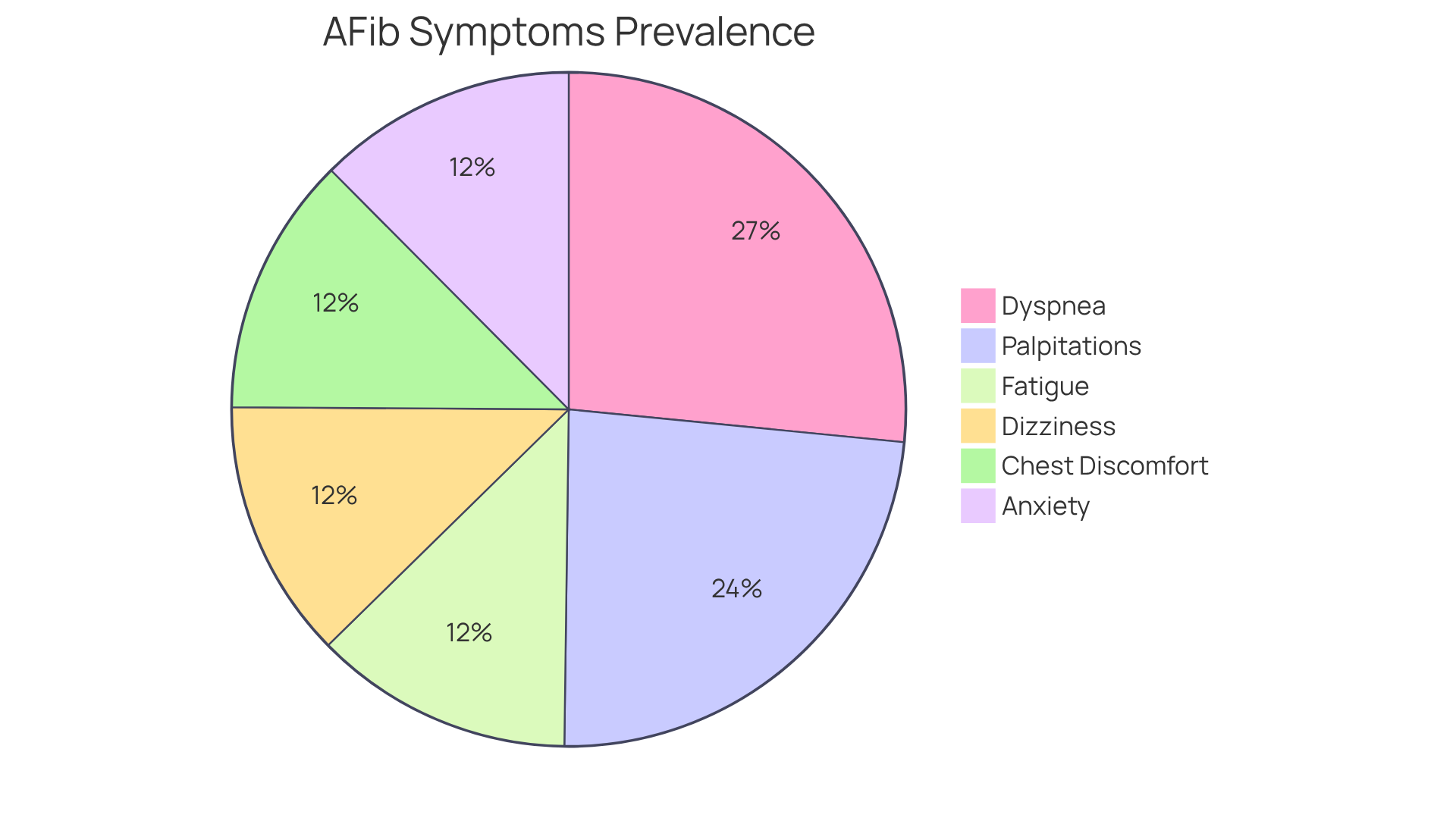
Identifying atrial fibrillation (AF) with rapid ventricular response (RVR) quickly is crucial for preventing serious complications, as can you die from afib with rvr, especially in skilled nursing facilities (SNFs) where older adults often face multiple health challenges. Have you or a loved one ever felt anxious about heart health? Understanding your medical history, undergoing thorough physical exams, and getting essential tests like electrocardiograms (ECGs) and Holter monitoring can make a significant difference. Regular check-ups are vital for this age group, as early detection allows for timely interventions that can greatly enhance quality of life.
Amavita's CardioElite™ program stands out as the nation’s first AI-powered cardiovascular management system designed specifically for SNFs. This innovative program uses a portable, FDA-cleared AI ultrasound for bedside cardiac diagnostics, providing real-time guidance for accurate imaging. Imagine receiving a report on your heart's structure and function within minutes! This rapid feedback not only aids in early detection but also supports informed decision-making. Furthermore, the program offers a guided pathway to AHA certification and comprehensive staff education, ensuring that healthcare teams are well-equipped to manage AF and RVR effectively.
Cardiologists stress the importance of understanding the nuances of AF and RVR, especially considering that can you die from afib with rvr, to tailor treatment plans that meet the unique needs of older adults. In fact, in 2021, AF/AFL accounted for 8.36 million disability-adjusted life years (DALYs), underscoring the significant impact of this condition. However, the focus remains on how Amavita's innovative technologies can support timely diagnosis and management. By reinforcing the need for robust evaluation strategies, we can work together to improve health outcomes and provide the compassionate care that every patient deserves.
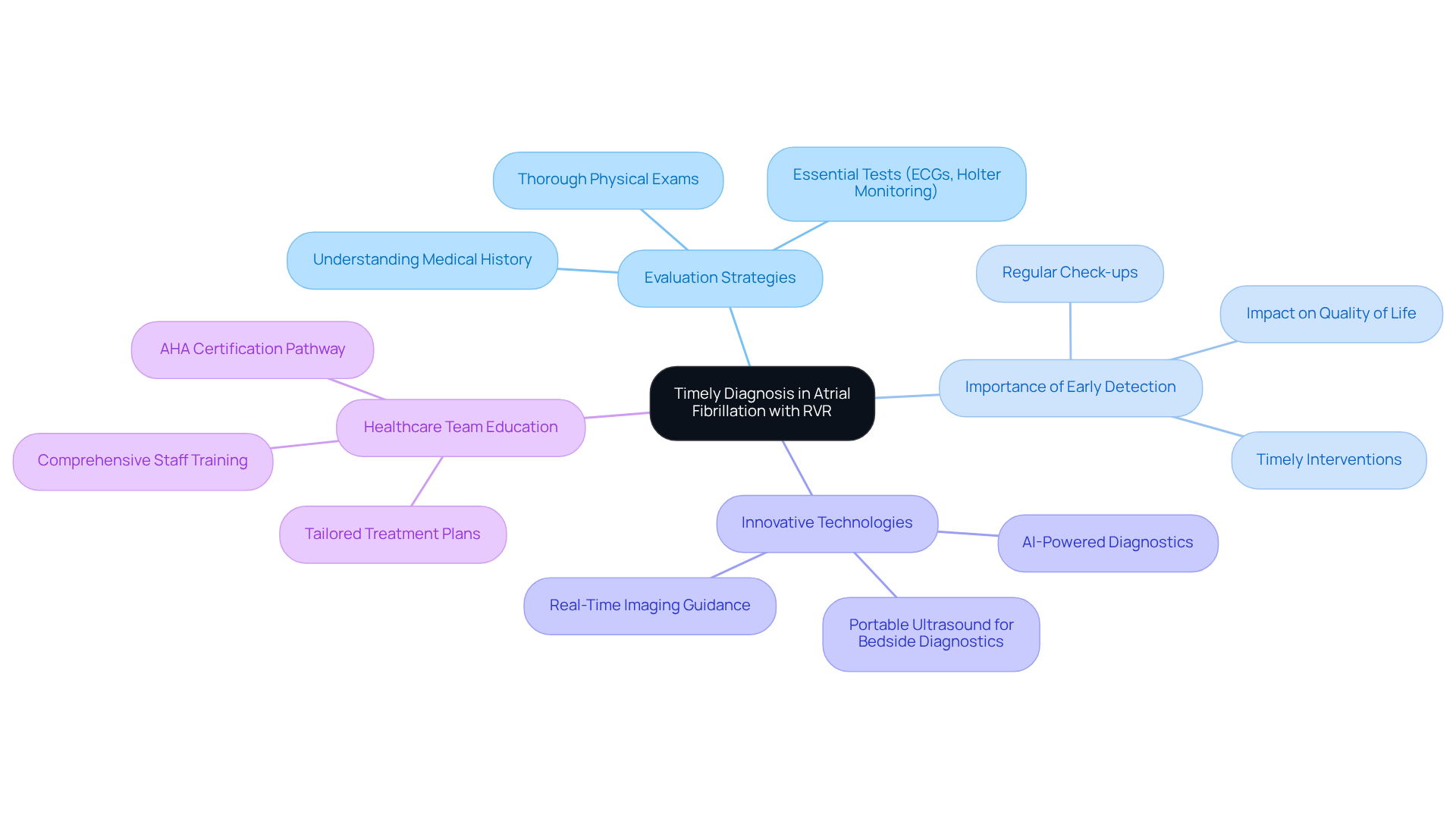
If you or a loved one is facing atrial fibrillation with rapid ventricular response (RVR), you might wonder, can you die from afib with rvr? It’s important to know that there are various treatment options available, tailored to meet individual needs. Many doctors recommend beta-blockers, like metoprolol, to help manage pulse rates effectively. Studies have shown that metoprolol tends to have a lower failure rate compared to other medications, such as diltiazem and amiodarone. In fact, it can achieve rate control within four hours more reliably than diltiazem, making it a preferred choice in urgent situations.
Calcium channel blockers can also assist in managing heart rate, but beta-blockers are often favored due to their proven effectiveness and safety. Additionally, anticoagulants, including newer oral agents like apixaban and rivaroxaban, play a crucial role in reducing stroke risk for those with AFib, especially if there’s a history of thromboembolic events.
For those who find that medications aren’t enough, catheter ablation might be a suitable option. This minimally invasive procedure has shown significant effectiveness, with research indicating that individuals can experience up to a 42% improvement in their quality of life after just one year. Moreover, catheter ablation can be four times more effective than antiarrhythmic medications alone in preventing the return of irregular rhythms associated with AFib.
It’s essential to remember that personalized treatment plans are key. A cardiac electrophysiologist, who specializes in heart rhythm disorders, can provide tailored recommendations based on your unique medical history and needs. As one cardiologist shared, "Countless individuals have experienced life-changing improvements in their health and quality of life by undergoing a catheter ablation." This highlights the potential for advanced treatment strategies to truly transform lives while addressing the concern of can you die from afib with rvr.
If you have any concerns or questions about your treatment options, don’t hesitate to reach out for support. You deserve to feel empowered and informed about your health.
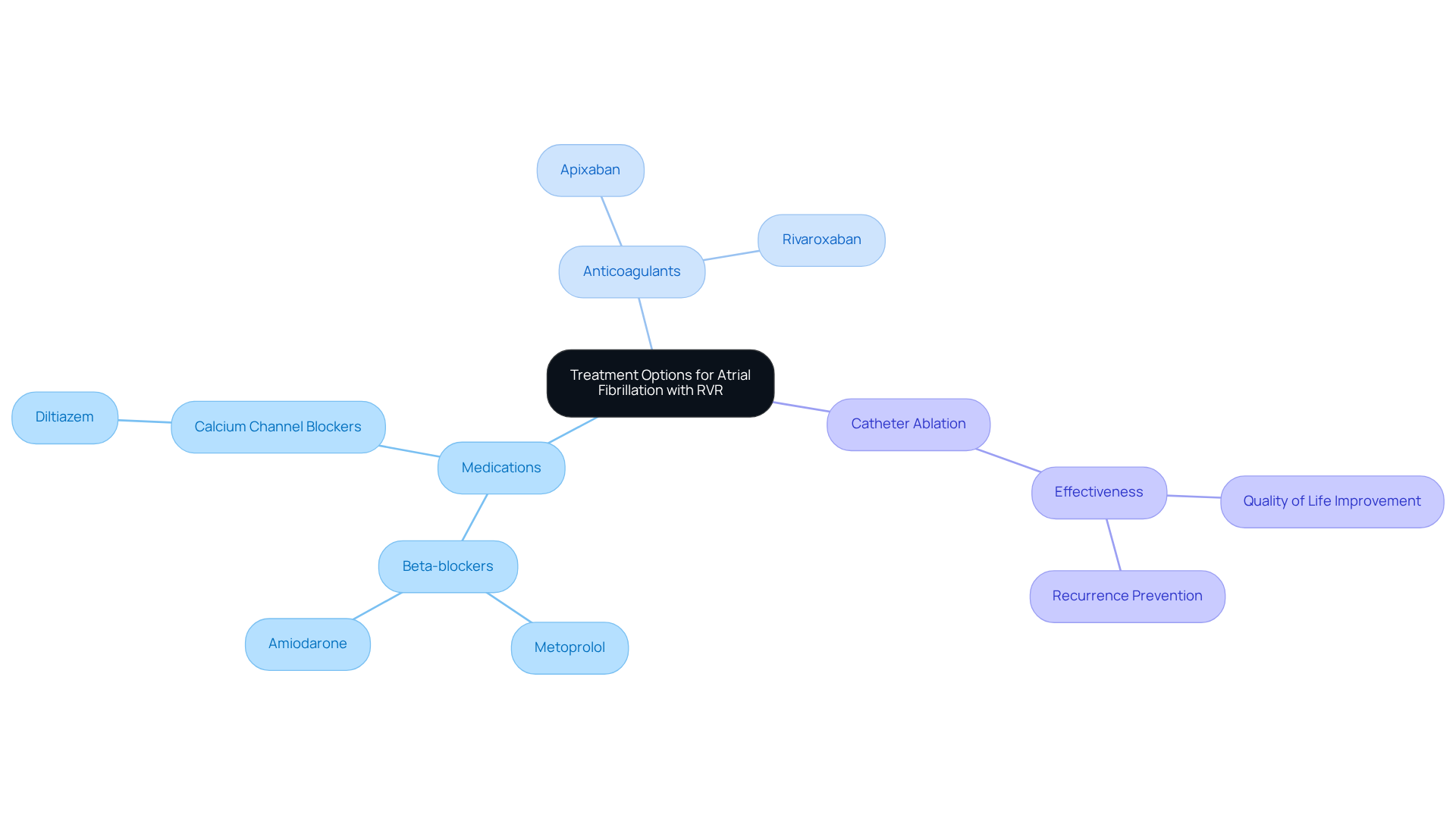
Making lifestyle changes is vital for managing atrial fibrillation with rapid ventricular response effectively. A heart-healthy diet serves as a strong foundation, focusing on a colorful array of fruits, vegetables, whole grains, and lean proteins, while keeping salt and saturated fats to a minimum. Research indicates that diets like the Mediterranean diet can significantly boost cardiovascular health and alleviate symptoms of atrial fibrillation. For instance, one study highlighted that individuals who embraced a Mediterranean diet experienced better overall cardiovascular health compared to those who did not.
In addition to dietary adjustments, regular physical activity plays a crucial role. Engaging in moderate exercise not only aids in weight management but also enhances cardiovascular health, potentially reducing episodes of atrial fibrillation. Stress-relief techniques, such as yoga and meditation, have shown promise in lowering stress levels, further benefiting heart health. It's also important to avoid tobacco and manage alcohol intake, as excessive alcohol consumption has been linked to an increased risk of atrial fibrillation.
Amavita's CardioElite™ program complements these lifestyle changes by offering real-time diagnostic data and 24/7 cardiology consultation. This support allows individuals to closely monitor their cardiovascular health and receive timely advice on managing their condition. Real-life examples of heart-healthy diets for those with atrial fibrillation include meal plans rich in plant-based foods, which are naturally low in saturated fats and packed with essential nutrients. Incorporating foods like leafy greens, legumes, and whole grains can provide vital vitamins and minerals that support heart function.
By adopting these lifestyle changes and utilizing the resources available through CardioElite™, individuals can significantly improve their quality of life and reduce the frequency of atrial fibrillation episodes. Remember, you’re not alone in this journey; support is available, and taking these steps can lead to a healthier, more fulfilling life.
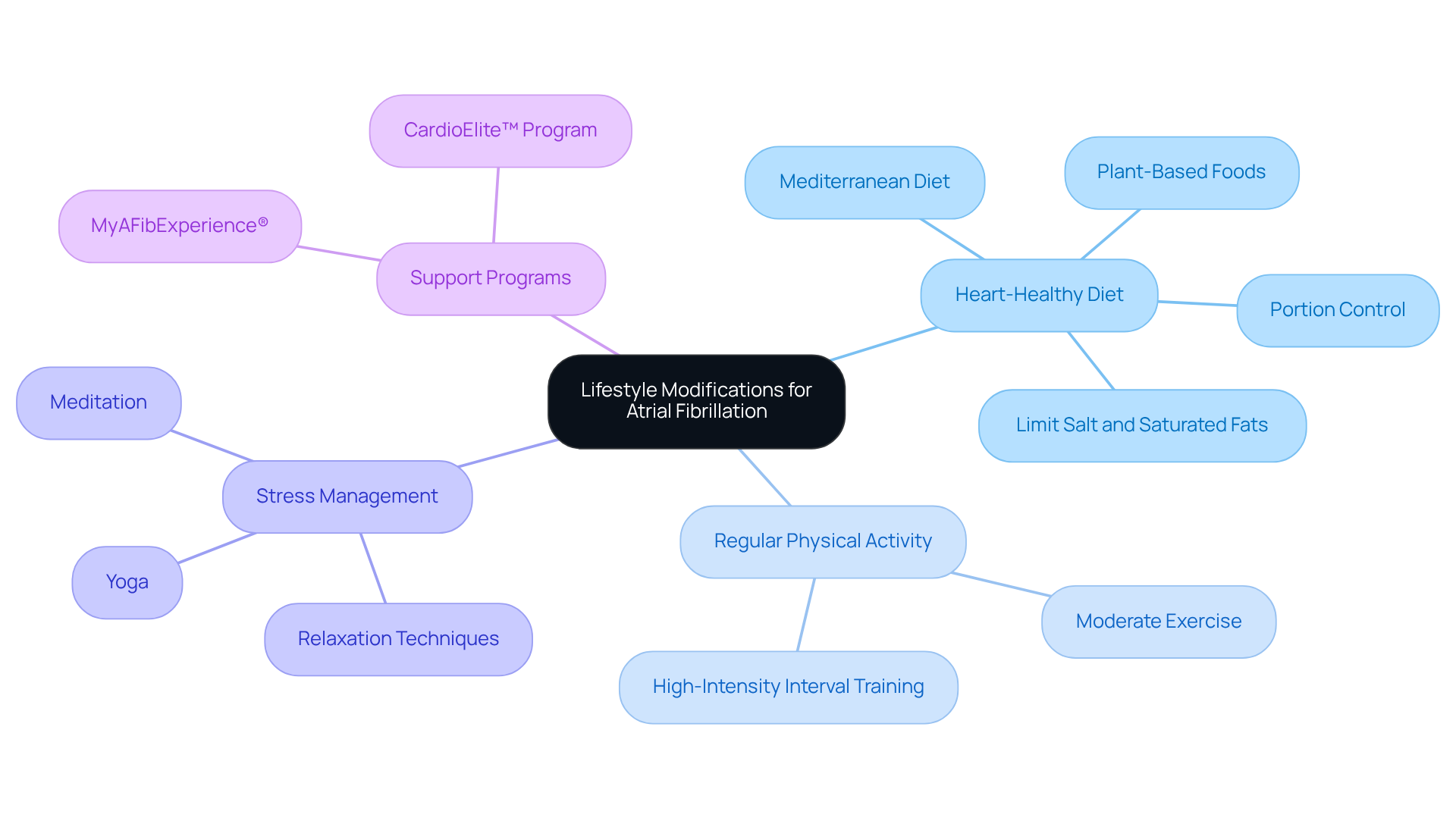
If you or a loved one is dealing with atrial fibrillation (AFib) and rapid ventricular response, it’s natural to have concerns about whether you can die from AFib with RVR and what this means for your long-term health. Factors like age, overall health, and how well treatment protocols are followed can significantly influence outcomes.
Research shows that untreated AFib raises the question, can you die from AFib with RVR, as it can lead to serious complications, including heart failure and stroke, which can greatly reduce life expectancy. For instance, individuals with untreated AFib may experience an average decline in life expectancy of about 2.6 years. This impact is even more pronounced for younger individuals aged 35-49, who could lose as much as 3.4 years of life.
However, there’s hope. With the right management strategies—like medications, lifestyle changes, and regular check-ups—many people can lead active and fulfilling lives. It’s essential to engage with healthcare providers, especially cardiac electrophysiologists, to create personalized treatment plans that truly optimize your health. Evidence suggests that proactive management not only improves quality of life but also reduces the chances of being re-hospitalized due to recurring AFib episodes, which can affect over 21% of individuals within a year.
Real-life stories show that those who adhere to their treatment and participate in regular monitoring often report better health outcomes. This highlights the importance of education and being actively involved in your healthcare decisions. As many cardiologists emphasize, early diagnosis and intervention are crucial for effectively managing AFib, as the question remains, can you die from AFib with RVR, leading to improved life expectancy and overall well-being.
So, if you’re feeling uncertain or anxious, remember that support is available. Reach out to your healthcare team—they’re there to help you navigate this journey with care and understanding.
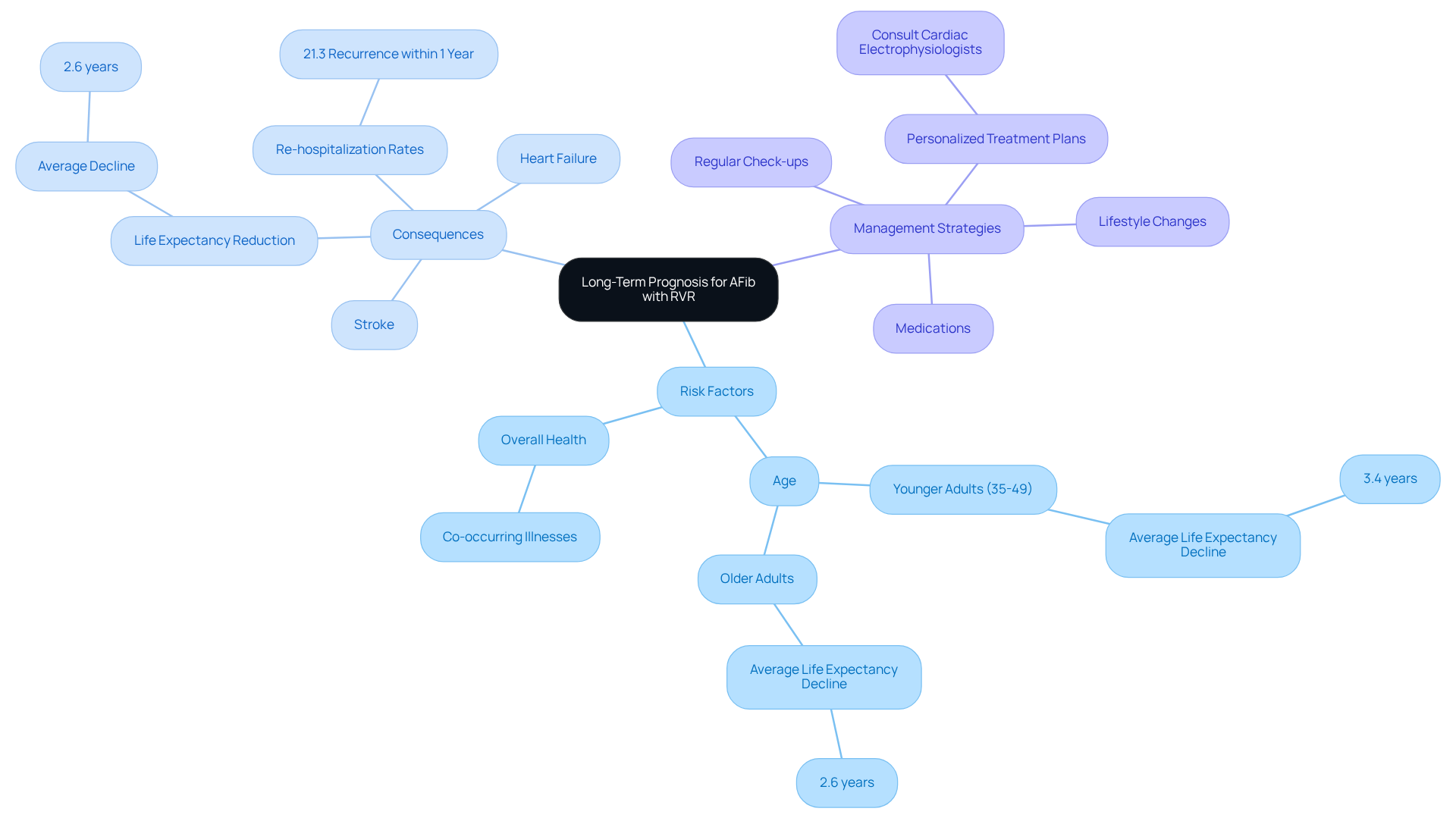
Managing atrial fibrillation with rapid ventricular response (RVR) can feel overwhelming, and it raises the question, can you die from afib with rvr, but you’re not alone. At Amavita Heart and Vascular Health®, we’re here to provide the education and support you need. Our comprehensive resources empower you to understand your condition, explore treatment options, and make necessary lifestyle changes. We’re dedicated to offering innovative and compassionate cardiovascular care, ensuring you receive personalized attention tailored to your unique needs.
Support groups are a vital part of this journey. They create a sense of community among individuals facing similar challenges, offering emotional support and a space to share experiences and coping strategies. Engaging in these programs can significantly enhance your involvement in your care. In fact, data shows that individuals who participate in support programs are more likely to follow treatment plans and achieve better health outcomes.
Open communication with your healthcare providers is essential. It fosters personalized care and helps you feel valued and understood. At Amavita, we emphasize the importance of a supportive environment, which builds trust and collaboration, ultimately improving the management of atrial fibrillation. Our services, including advanced diagnostic imaging and minimally invasive procedures like cardiac catheterization, are designed to restore heart function and enhance your quality of life.
As we look toward 2025, our commitment to patient-centered care continues to grow. We recognize the importance of education and community support in navigating the complexities of atrial fibrillation with rapid ventricular response, especially when considering the question, can you die from afib with rvr. Additionally, our groundbreaking research initiatives aim to expand treatment options and improve health outcomes, reinforcing our dedication to comprehensive cardiovascular care.
If you have questions or need support, please reach out. We’re here to help you every step of the way.
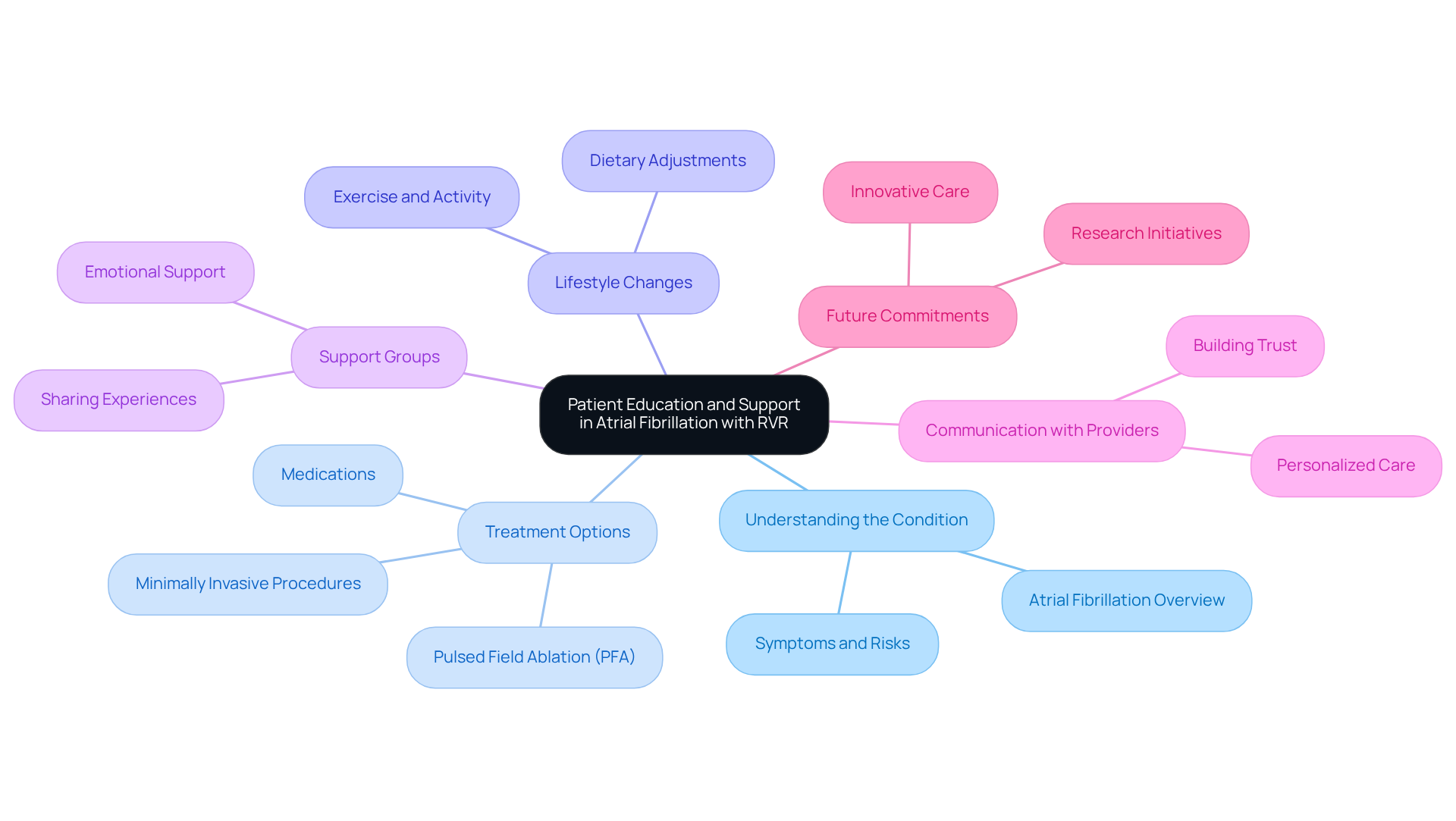
Recent advancements in technology have truly transformed how we manage atrial fibrillation, leading to concerns about whether you can die from afib with rvr. Innovations like remote monitoring tools and wearable ECG monitors allow healthcare providers to keep a close eye on individual well-being in real-time. This means that treatment plans can be adjusted promptly, which is so important for your health. For instance, research shows that ongoing observation through wearables can catch AFib early, a crucial step in preventing strokes and managing cardiovascular health effectively.
Moreover, AI-driven diagnostic tools are enhancing the accuracy of care, paving the way for personalized treatment strategies that cater to your unique needs. New ablation techniques, such as pulsed field ablation, represent a significant leap forward. These methods not only improve treatment efficacy but also reduce recovery times, making the process more comfortable for you. As Dr. Vivek Reddy points out, preventing stroke is the primary goal in managing atrial fibrillation, especially considering that many wonder, can you die from afib with rvr, which highlights the importance of these technological advancements in achieving that aim.
The rise of wearable technology in managing atrial fibrillation is particularly noteworthy. With around 5 million individuals in the U.S. affected by AFib, and projections suggesting this number could rise to 12.1 million by 2030, the need for effective monitoring solutions has never been more pressing. Wearable devices, like smartwatches, are increasingly being used to track heart rhythms, sending notifications for AFib episodes and encouraging proactive care. This shift towards technology-driven management not only boosts patient engagement but also creates a more responsive healthcare environment, ultimately leading to better outcomes for those living with AFib.
Isn’t it reassuring to know that these advancements are here to support you? With the right tools and care, managing atrial fibrillation can be a more manageable journey. If you have any concerns or questions, don’t hesitate to reach out for support. Your health and comfort are what truly matter.
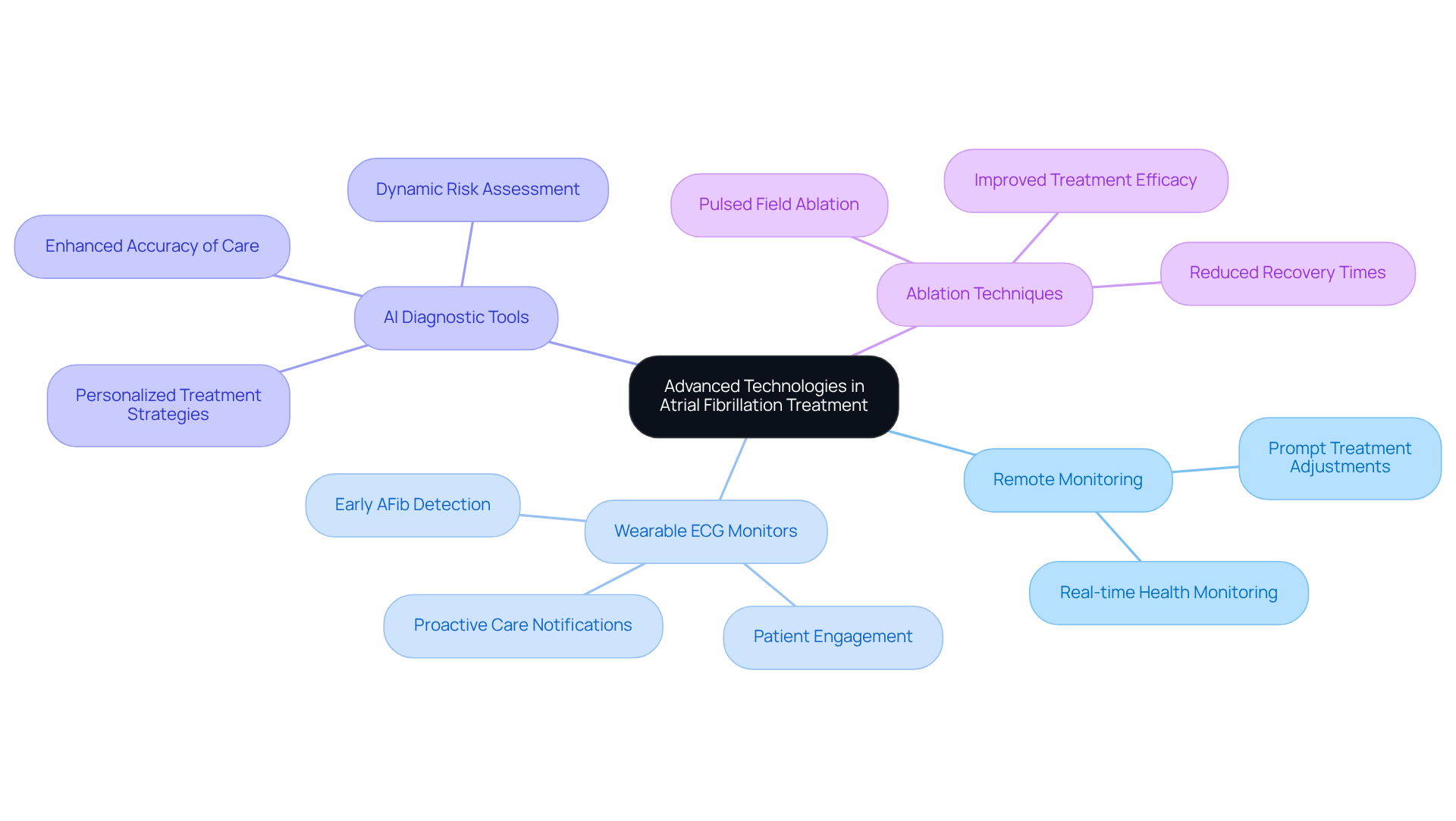
Community outreach and awareness initiatives play a crucial role in promoting cardiovascular well-being, particularly in addressing the question: can you die from afib with rvr? Have you ever wondered how wellness fairs, informational seminars, and partnerships with local organizations can help spread vital information about AF? These programs are designed to share essential insights regarding AF, including the question of can you die from afib with rvr, its associated risks, and effective management strategies.
At Amavita Heart and Vascular Wellness, we’re dedicated to actively engaging with our community. Our goal is to reduce the stigma surrounding cardiovascular issues, encourage early detection, and enhance overall circulatory health, particularly among marginalized groups. The 2025 AFib initiatives are here to empower you with knowledge about your cardiovascular wellness, fostering a culture of proactive care and prevention.
Did you know that cardiovascular conditions account for 1 in 5 deaths in the U.S.? This statistic highlights the importance of raising awareness about AF and its risks. As healthcare leaders emphasize, community involvement is essential for improving health outcomes. We want to ensure that everyone has access to the information and resources necessary for maintaining heart health. Remember, you’re not alone in this journey; we’re here to support you every step of the way.

Understanding the complexities of atrial fibrillation with rapid ventricular response (AFib RVR) is crucial for anyone affected by this condition. The risks associated with AFib RVR, such as an increased chance of stroke and heart failure, underscore the importance of timely diagnosis and proactive management. Thankfully, with advancements in treatment options and lifestyle modifications, individuals can significantly enhance their quality of life and reduce these risks.
Throughout this discussion, we’ve shared key insights about:
It’s clear that effective management strategies—like medication, lifestyle changes, and innovative technologies—can lead to better health outcomes for patients. Moreover, community support and patient education are vital in navigating the challenges posed by AFib RVR.
Ultimately, awareness and proactive management can empower individuals facing AFib RVR to lead healthier lives. Engaging with healthcare providers, participating in support networks, and utilizing available resources can truly make a difference in managing this condition. As the prevalence of AFib continues to rise, it’s essential to prioritize heart health and seek support, ensuring that no one has to navigate this journey alone.
What is atrial fibrillation with rapid ventricular response (AFib RVR)?
Atrial fibrillation with rapid ventricular response (AFib RVR) is a condition where the heart's upper chambers (atria) beat irregularly and rapidly, leading to an increased heart rate that can affect the heart's ability to pump blood effectively.
Can you die from AFib with RVR?
Yes, if AFib with RVR is not managed properly, it can lead to serious complications such as stroke and heart failure, which can be life-threatening.
What are the risks associated with untreated AFib RVR?
The risks include a significantly increased chance of stroke due to blood clots forming in the heart, which can travel to the brain, and heart failure, as the heart struggles to pump blood effectively when it beats too quickly.
How prevalent is atrial fibrillation in the United States?
Current research indicates that by 2030, over 12 million people in the United States will be affected by atrial fibrillation.
What symptoms should one watch for with AFib RVR?
Common symptoms include palpitations, shortness of breath, dizziness, fatigue, chest discomfort, and feelings of anxiety, particularly in older adults.
Why is recognizing symptoms of AFib RVR important?
Early recognition of symptoms is crucial for timely medical intervention, which can prevent serious complications such as stroke or worsening heart failure.
What is Amavita Heart and Vascular Health's approach to managing AFib RVR?
Amavita Heart and Vascular Health offers personalized care, advanced outpatient procedures, and comprehensive arrhythmia management, which includes monitoring technology and 24/7 cardiology consultation.
How can lifestyle changes impact AFib RVR?
Making lifestyle changes, such as losing weight and staying active, can help reduce some risk factors associated with atrial fibrillation.
What should patients do if they experience symptoms of AFib RVR?
Patients are encouraged to reach out to healthcare providers for assessment and management, maintain open communication, and keep a symptom diary to track changes in health status.
What resources does Amavita provide for individuals facing challenges with AFib RVR?
Amavita provides specialized cardiovascular care, advanced imaging, thorough evaluations, and support for proactive monitoring and education regarding symptoms and management strategies.